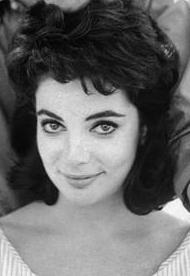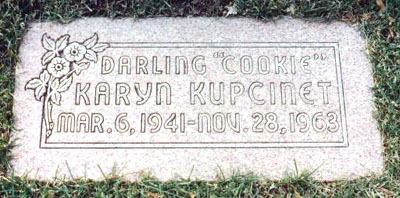
Dead in the Wake of the Kennedy Assassination
Hollywood Homicide
If conspiracists are right about there being a "cleanup squad" that went around killing off assassination witnesses, the first person they got was actress Karin Kupcinet (right).
As Penn Jones, Jr. tells it in Forgive My Grief II:
A few days before the assassination, Karyn Kupcinet, 23, was trying to place a long distance telephone call from the Los Angeles area. According to reports, the long distance operator heard Miss Kupcinet scream into the telephone that President Kennedy was going to be killed.
Two days after the assassination, Miss Kupcinet was found murdered in her apartment. The case has never been solved.
. . .
There was an Associated Press dispatch printed in the Chicago Daily News of November 23, 1963, originating from Oxnard, California, which told approximately the same story as we have on Miss Kupcinet. The story read:
A telephone company executive said that 20 minutes before President Kennedy was assassinated a woman caller was overheard whispering:
"The President is going to be killed."
Ray Sheehan, manager of the Oxnard division of General Telephone Co., said the caller "stumbled into our operator's circuits," perhaps by misdialing.
Sheehan said the woman "seemed to be a little bit disturbed." Besides predicting the President's death, he said, she "mumbled several incoherent things."
. . .
Sheehan said there was no way to trace the call. All he could say was that it originated in the Oxnard-Camarillo area, some 50 miles north of Los Angeles.(1)
Karyn Kupcinet was indeed murdered in her West Hollywood apartment, although not two days after the assassination (as Jones asserted), but almost a week later.
Her nude body was discovered on the evening of November 30, 1963, a Saturday. She was laying on her couch with the television turned on, and a coffee pot and a brandy snifter full of cigarette butts overturned on the floor. A cup of coffee, partially consumed, was on a stand across the room.(2)
She had, according to the coroner, been dead about three days.(3) The cause of death: murder by manual strangulation.(4)
Karyn was last seen alive on the preceding Wednesday night: Thanksgiving Eve. She had talked to her father, Chicago columnist Irv Kupcinet, on the phone, and then gone to have dinner with two friends, actor Mark Goddard and his wife Marcia. She returned to her apartment, and was visited by two other friends, actor Robert Hathaway and free lance writer Edwin Stephen Rubin.(5) The three watched TV for a while, and Karyn got sleepy and went to bed. Hathaway and Rubin let themselves out at about 11:00 p.m. after the Danny Kaye show. They were the last people, aside from the murderer, to see her alive.
Police intensely questioned Hathaway, Rubin, an unemployed actor named William Mamches, and Karyn's boyfriend, actor Andy Prine.(6) Prine, the most successful of the group, was starring on the TV series Wide Country. Prine had been trying to curtail his relationship with Kupcinet, whom he had gotten pregnant the summer before. (The pregnancy ended in an abortion.)(7) Karyn, rather neurotic and desperate, had resorted to forging threatening notes to herself in an apparent attempt to get more attention from Prine.(8)
In spite of intensive investigation by the Homicide Division of the Los Angeles Country Sheriff's Department, the murder remained unsolved. As of this writing, the case is still considered "open," but the odds of it ever being solved are obviously slim.
A "Mysterious Death"
It's certainly correct to say that Kupcinet's death was "mysterious." Indeed, that's almost an understatement. But did it have anything to do with the Kennedy assassination?
Jones believed that Kupcinet was the woman who made the distraught phone call to an operator shortly before the assassination, but neither he nor anybody else has ever produced any evidence of that. Why would she drive 50 miles north to make a phone call she could have made from her own apartment — or from a pay phone if she feared her call would be traced — is a major mystery. And why not call the FBI or the Secret Service, rather than babbling incoherently to an operator?
Of course, a different way of connecting Kupcinet to the assassination is through her father, a columnist for the Chicago Sun-Times and a major celebrity in the Windy City. Irv Kupcinet knew Jack Ruby when Ruby lived in Chicago in the 1940s.(9) But nobody has connected Irv Kupcinet to Ruby in 1963, in spite of meticulous tracing of Ruby's contacts by the Warren Commission, the House Select Committee, and literally scores of private researchers. And if Ruby somehow did call Kupcinet in Chicago and share information about a forthcoming assassination, why would Kupcinet call his daughter in California and share that information with her?
And even if he did, why would a conspiracy kill Karyn and not kill Irv too?
None of the people who came in contact with Karyn Kupcinet between the day of the assassination and her death heard her say anything about any foreknowledge of the assassination. She was disturbed and unhappy when she heard the news that Kennedy had been shot. According to author James Ellroy, Karyn and three of her friends (Andy Prine, Prine's friend Earl Holliman and Holliman's girlfriend) were all "bummed out" by the assassination, and went to Palm Springs on Friday evening, November 22nd. They all returned on Sunday evening, and Prine dropped Karyn off at her apartment.(10)
There is some inconsistency in accounts of Karyn's mood between Sunday night and late Wednesday night, when she was last seen alive.
Some sources describe Karyn as happy and upbeat. On Wednesday evening Karyn talked to her father in Chicago. According to Irv Kupcinet, "she seemed happy and had no problems."(11) Her mood at dinner with the Goddards was described by Mark Goddard who said "she was very happy and vivacious the last time we saw her. She's not the sort of girl who would commit suicide."(12)
But other accounts portray Karyn as a woman disturbed about her deteriorating relationship with Andy Prine. Prine himself talked to her on the phone twice on Wednesday evening.(13) The conversations had nothing to do with Kennedy, but rather with a baby that Karyn claimed had been left on her doorstep. There was apparently no such baby, and she simply concocted the story.(14)
Ironically, when police first searched Karyn's apartment, they discovered a rambling, neurotic note she had written. It said things such as:
I'm no good. I'm not really that pretty. My figure's fat and will never be the way my mother wants it.Why must I be so alone.
What's the use of living with nothing to believe in?
There's nothing only phony motives, selfish egoists, selfless people, fat heads and drunks and I want out.
I like President Kennedy, Bertrand Russell, Theodore Reiks, Peter O'Toole, Sydney J. Harris, Albert Finney.(15)
The note could be read as a suicide note — except for the fact that the coroner's findings entirely rule out suicide.
Karyn was a woman with problems. In addition to her deteriorating relationship with Prine, she was dependent on pills.(16) But none of her problems had anything to do with any "foreknowledge" of the JFK assassination.
Irv Kupcinet Responds
The death of Karyn Kupcinet was of course a crushing blow to Irv Kupcinet and his wife Essie, but the fact that conspiracists added his daughter to the list of "mystery deaths" piled insult on injury. In his column of February 9, 1992, Irv Kupcinet noted:
The NBC "Today Show" on Friday carried a list of people who died violently in 1963 shortly after the death of President John F. Kennedy and may have had some link to the assassination. The first name on the list was Karyn Kupcinet, my daughter. That is an atrocious outrage. She did die violently in a Hollywood murder case still unsolved. That same list was published in a book years ago with no justification or verification.
The book left the impression that some on the list may have been killed to silence them because of knowledge of the assassination. Nothing could be further from the truth in my daughter's case. The list apparently has developed a life of its own and for "Today" to repeat the calumny is reprehensible. Karyn no longer can suffer pain by such an inexcusable mention, but her parents and her brother Jerry can.(17)
Not surprisingly, during the production of the movie "JFK" and later after its release, Kupcinet repeatedly attacked the movie and Oliver Stone's conspiracy theories.(18)
Postscript
In the 1970 edition of his book Hollywood's Unsolved Mysteries, author John Austin devoted an entire chapter to the death of Karyn Kupcinet. In 1990 he published another edition of the book, and the Kupcinet murder received only a short paragraph.(19)

| Kupcinet's Grave in Memorial Park Cemetery, Wilmette, Illinois, courtesy Find a Grave website |
1. Jones, pp. 20-21. A careful check of the microfilm of the Chicago Daily News for November 23, 1963 failed to reveal the article Jones cites. But there is no doubt that the AP dispatch Jones quotes existed, since it was published in (for example) the Toronto Star Telegram on November 23rd. Jones may have obtained a clipping and been confused about the source, or the edition of the Chicago Daily News with the article may not have been microfilmed.
2. John Austin, Hollywood's Unsolved Mysteries. New York: Ace, 1970, p. 87.
3. ibid.
4. James Ellroy, "Glamour Jungle," GQ, December 1998, p. 291.
5. Austin, p. 92.
6. New York Daily News, December 2, 1963, pp. 3,6.
7. Ellroy, p. 299.
8. Ellroy, p. 294; Austin, p. 89.
9. Irv Kupcinet (with Paul Neimark), Kup: A Man, an Era, a City, Chicago: Bonus Books, 1988, p. 176.
10. Ellroy, p. 292.
11. Austin, p. 92.
12. Austin, p. 88.
13. Ellroy, p. 292.
14. Austin, p. 90.
15. Ellroy, p. 291.
16. Kupcinet, p. 190; Ellroy, pp. 290, 293.
17. "Kup & Company," Chicago Sun-Times, February 9, 1992, p. 14.
18. Jim Kielty, "Kup vs. JFK," Reader, December 25, 1992.
19. John Austin, Hollywood's Unsolved Mysteries. New York: Shapolsky, 1990, p. 271.